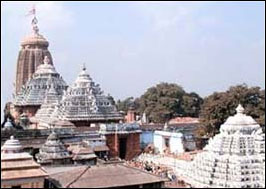Jagannath Temple in Puri has India’s Biggest Kitchen
By Sarada Lahangir | Aug 08, 2007

Puri (Orissa), July 13 : The famed Jagannath Temple in Puri, Orissa, boasts of having one of the biggest kitchens in the country.
Around 500 cooks and 300 helping hands prepare 56 different offerings known as ‘Mahaprasad’ or ‘Abhada’ for Lord Jagannath, which are served to the deity six times a day.
The kitchen has 32 rooms, 752 stoves and nine earthen pots.
The meals include seven different types of rice, four types of pulses, nine types of vegetables and different items of sweet dishes. Fine molasses, instead of sugar is used for preparing sweet dishes. But potatoes, tomatoes and cauliflower are not used in the temple.
Every meal that is prepared has a name like Jagannath Ballabh, ladu, mathapuli, sarapuli and many others.
‘You will never see it in any part of India. In one hour, food for one lakh (one hundred thousand) devotees can be prepared in the kitchen,’ claimed Balbhadra Mahapatra, a servitor at the kitchen.
Temple cooks say there is no limit to the quantity of offerings made.
Sukadev Mohapatra, another servitor, said: ‘It is not written in any book how much rice is to be cooked. Food is cooked for the devotees who come.’
Devotees consider the holy offerings as being as important as the prayers offered at the sanctum sanctorum.
‘This Mahaprasad has great significance because only people who are fortunate can have it. All your work is done and wishes are fulfilled after having it,’ said Radhakrishna Mahasuar, a devotee.
The 12th century Jagannath temple is one of the holiest places for Hindus and is usually swarmed with devotees, who come to get a glimpse of it.
Lord Jagannath is the incarnation of Lord Vishnu, the Preserver, one of the trinity of the Hindu pantheon. The other two are Brahma, the Creator and Shiva, the Destroyer.
Lord Jagannath’s idol [Deity] is carved in wood, unlike other Hindu temples where the idols [Deities] are made of granite or a combination of metals.















